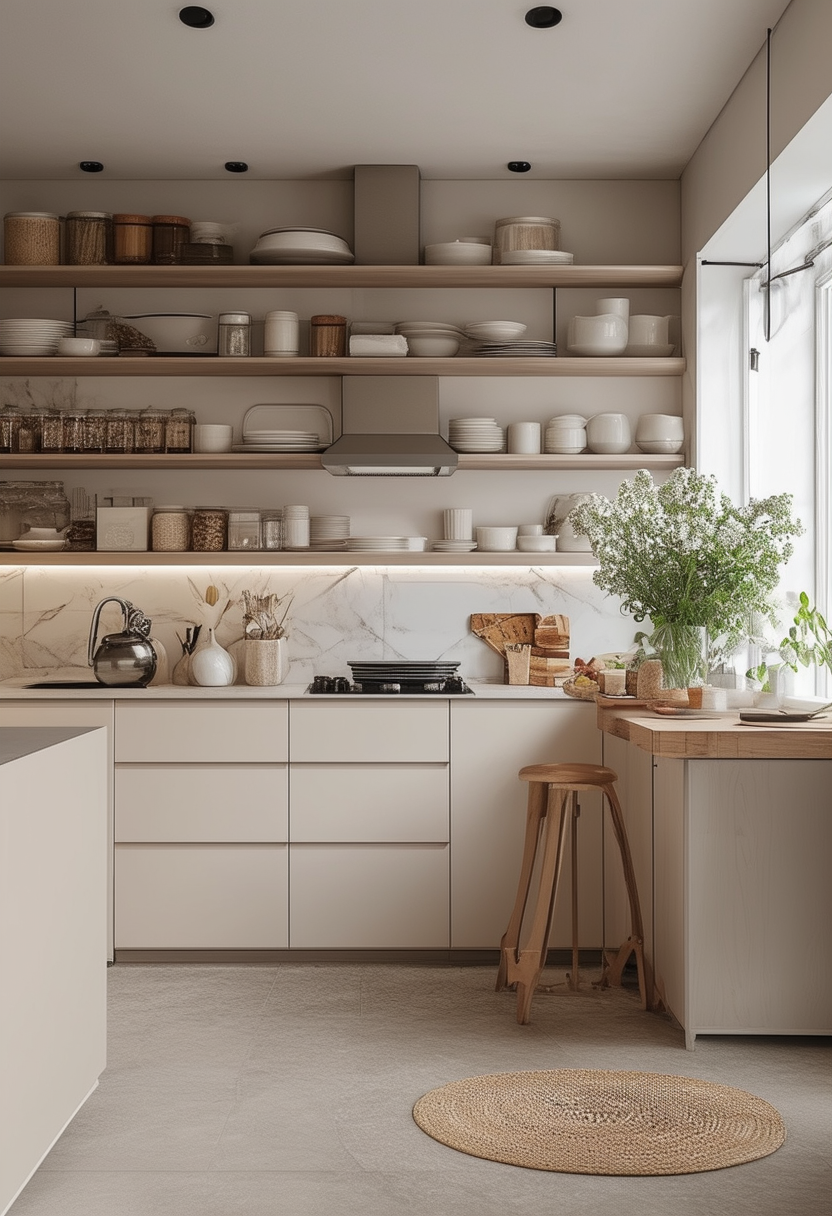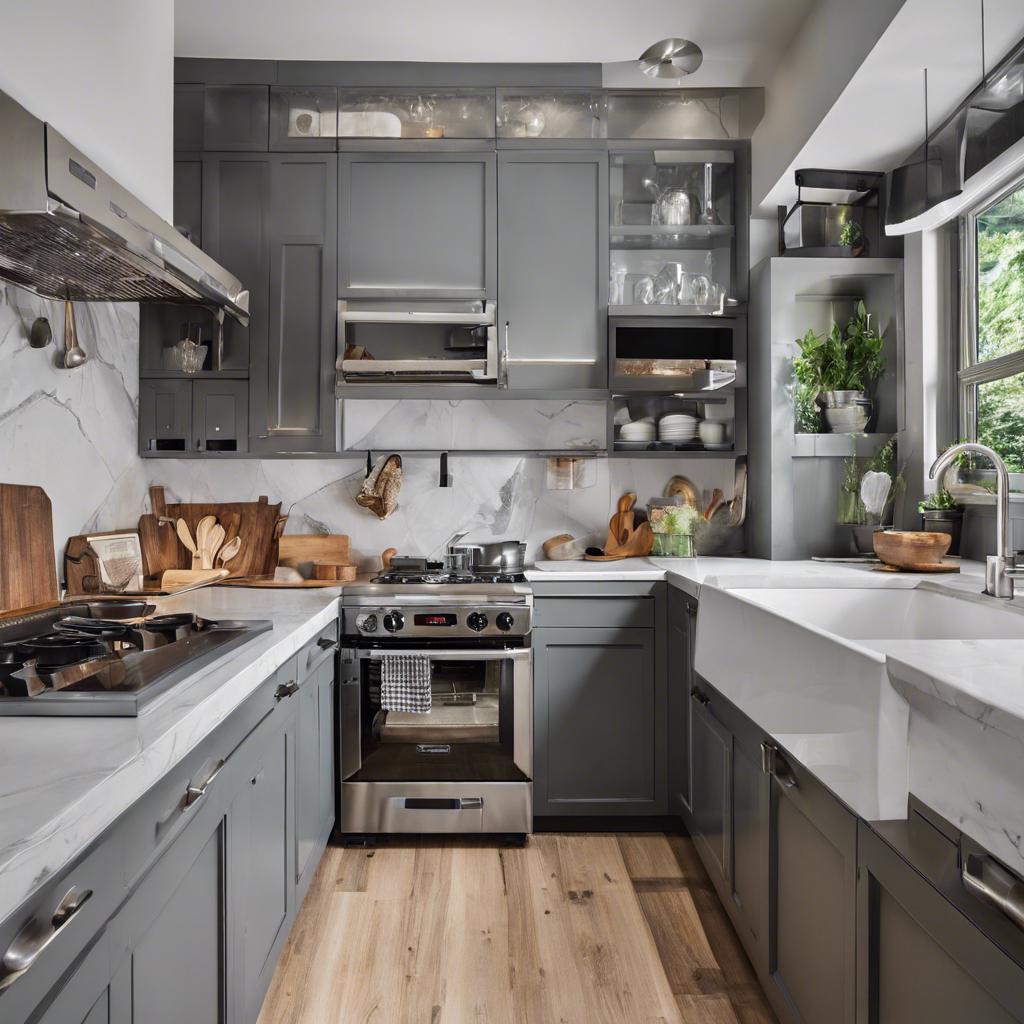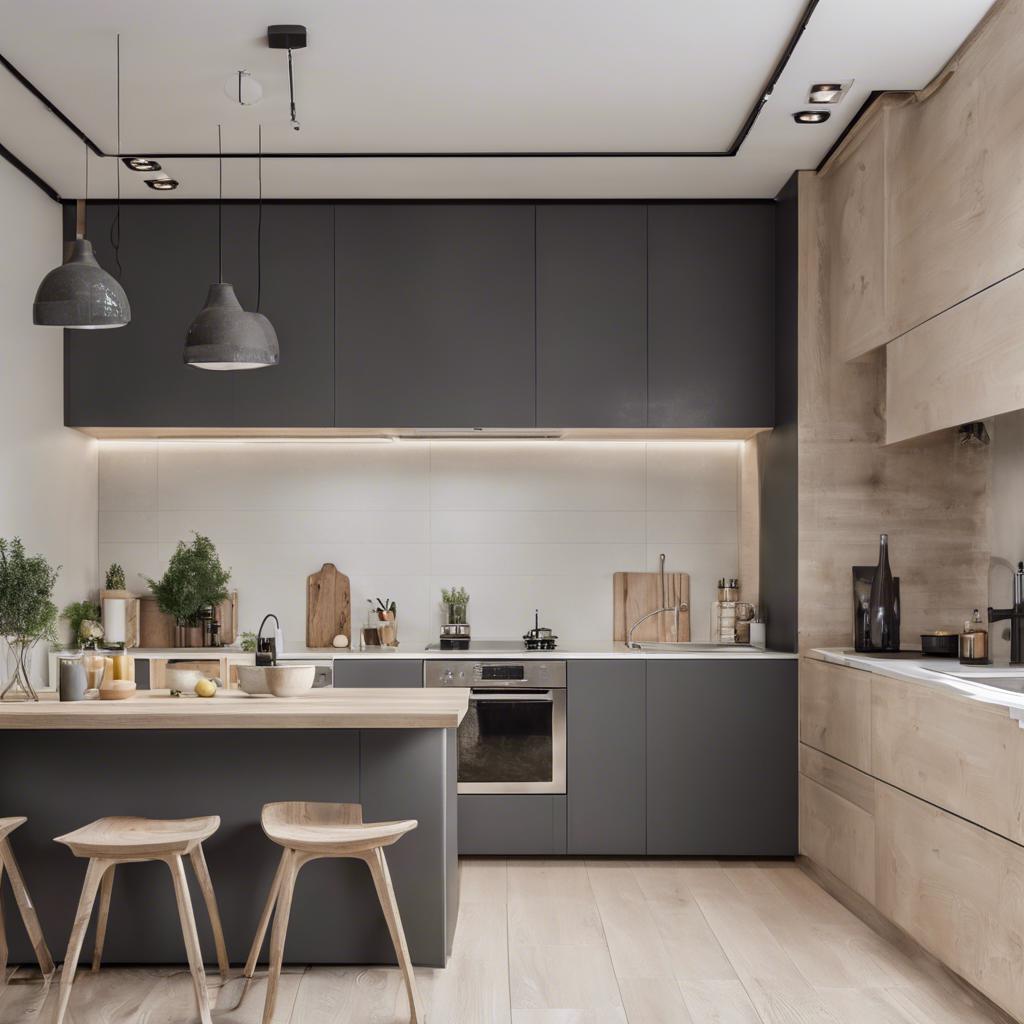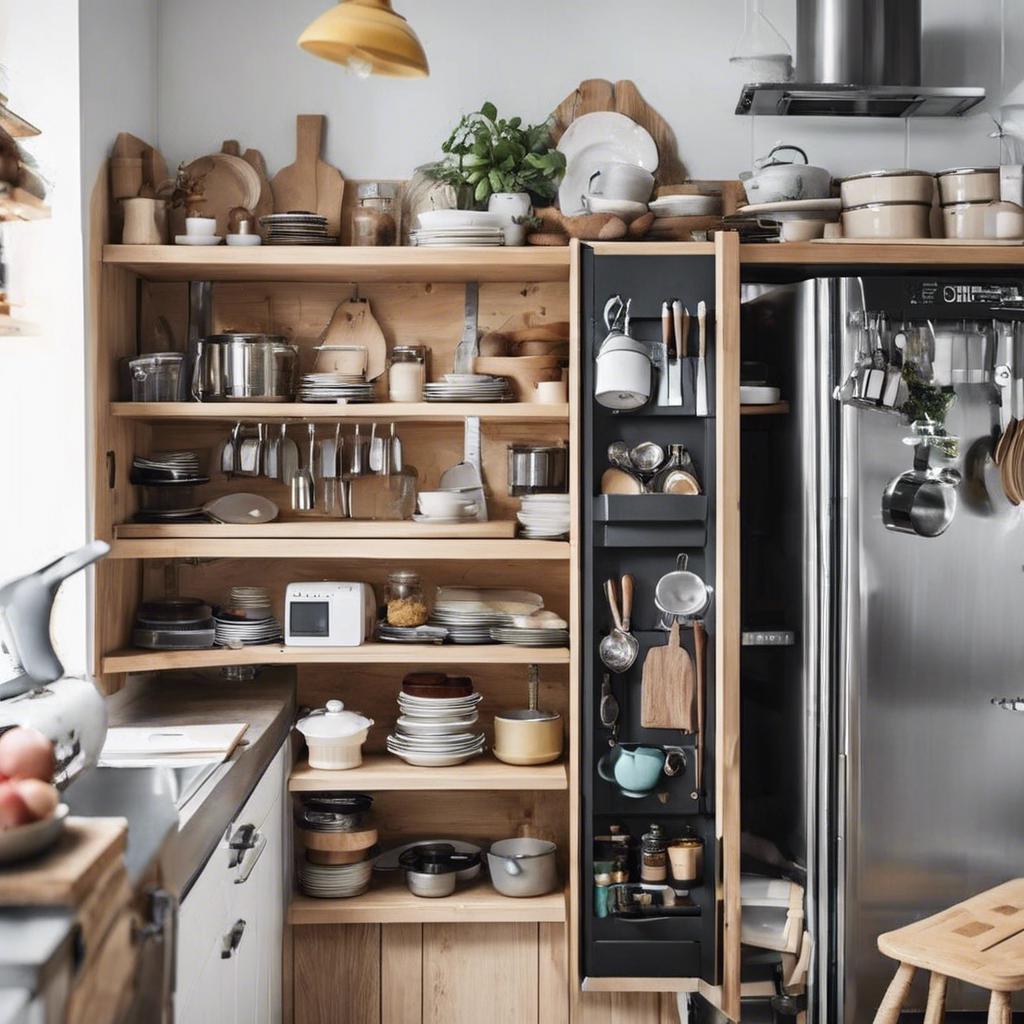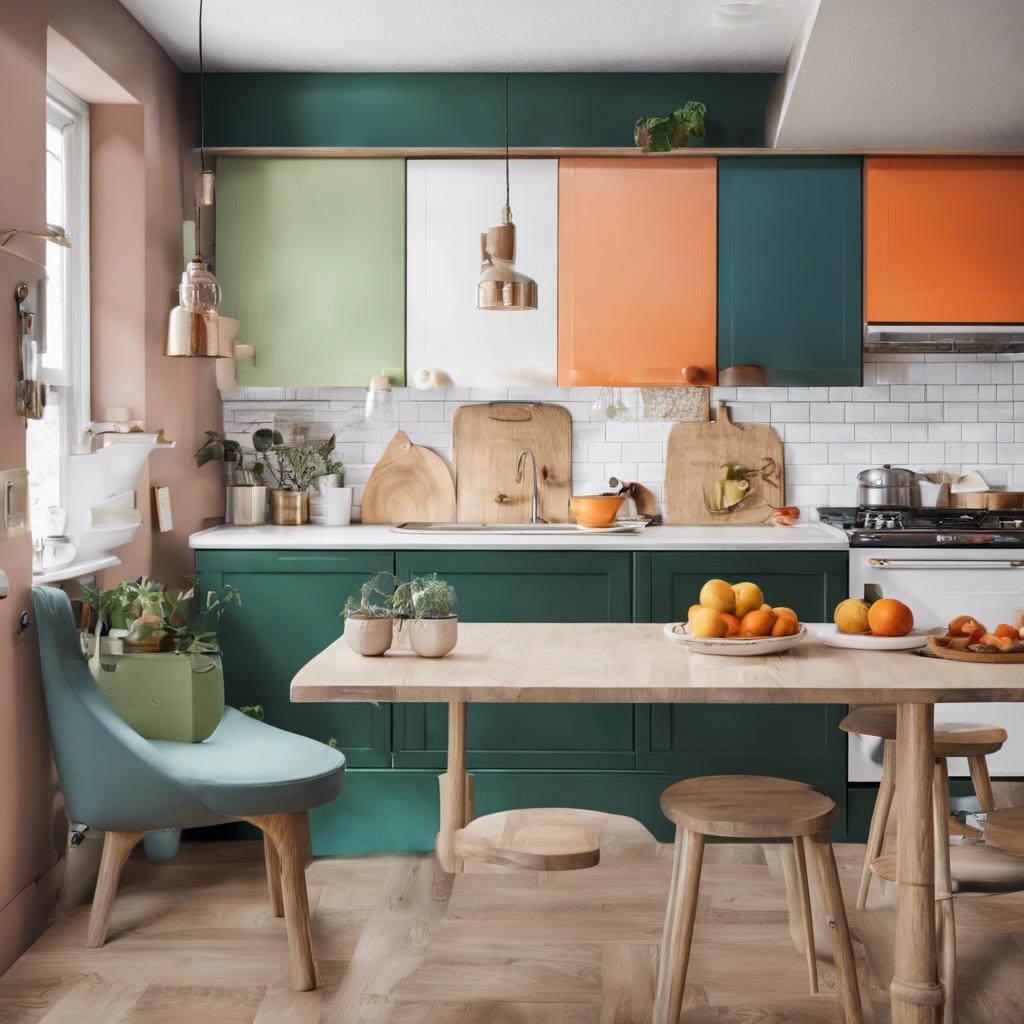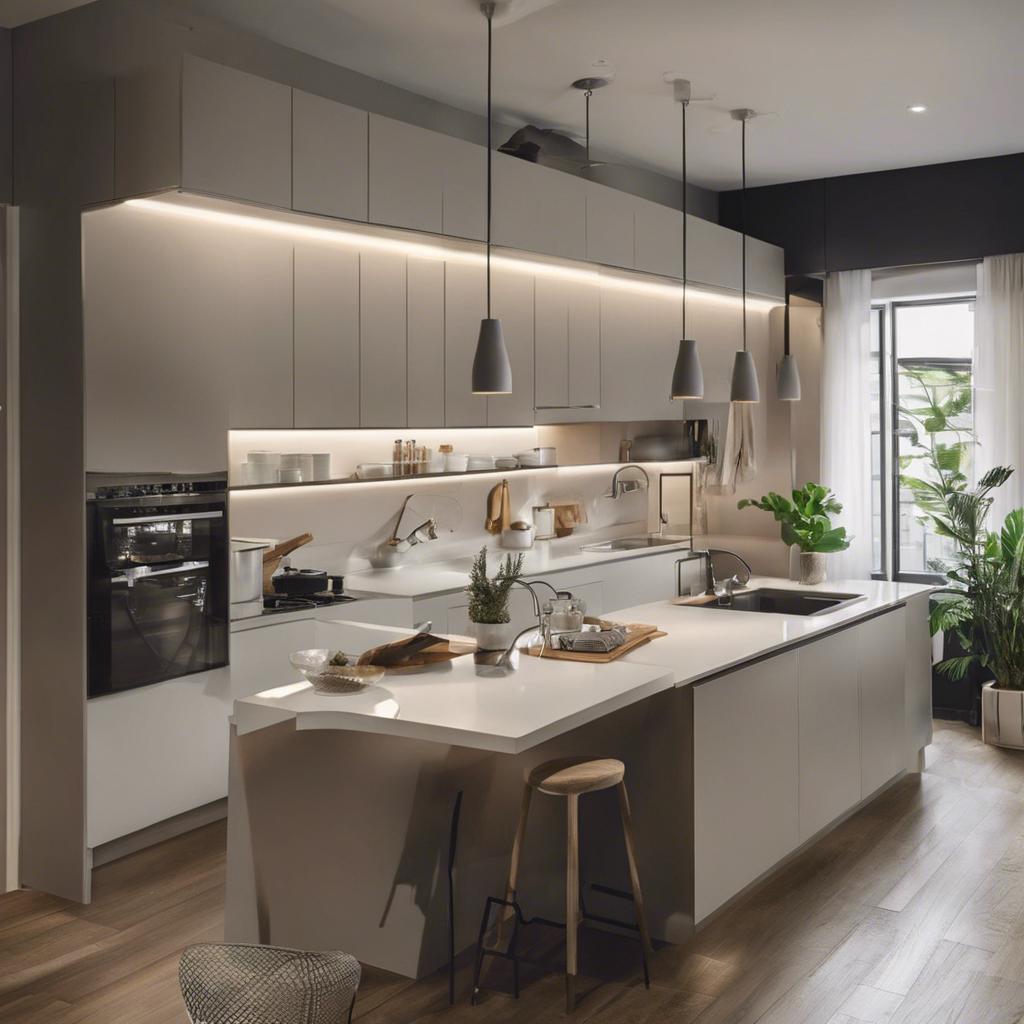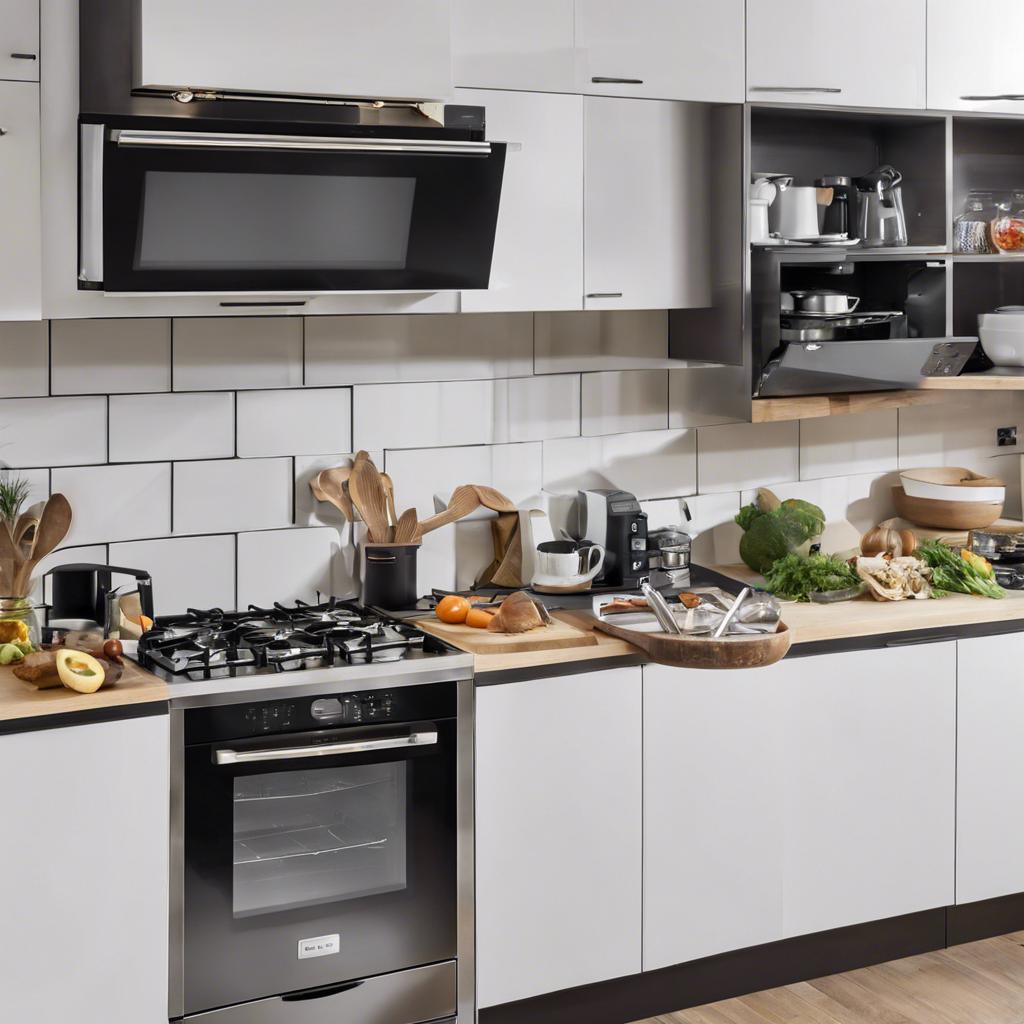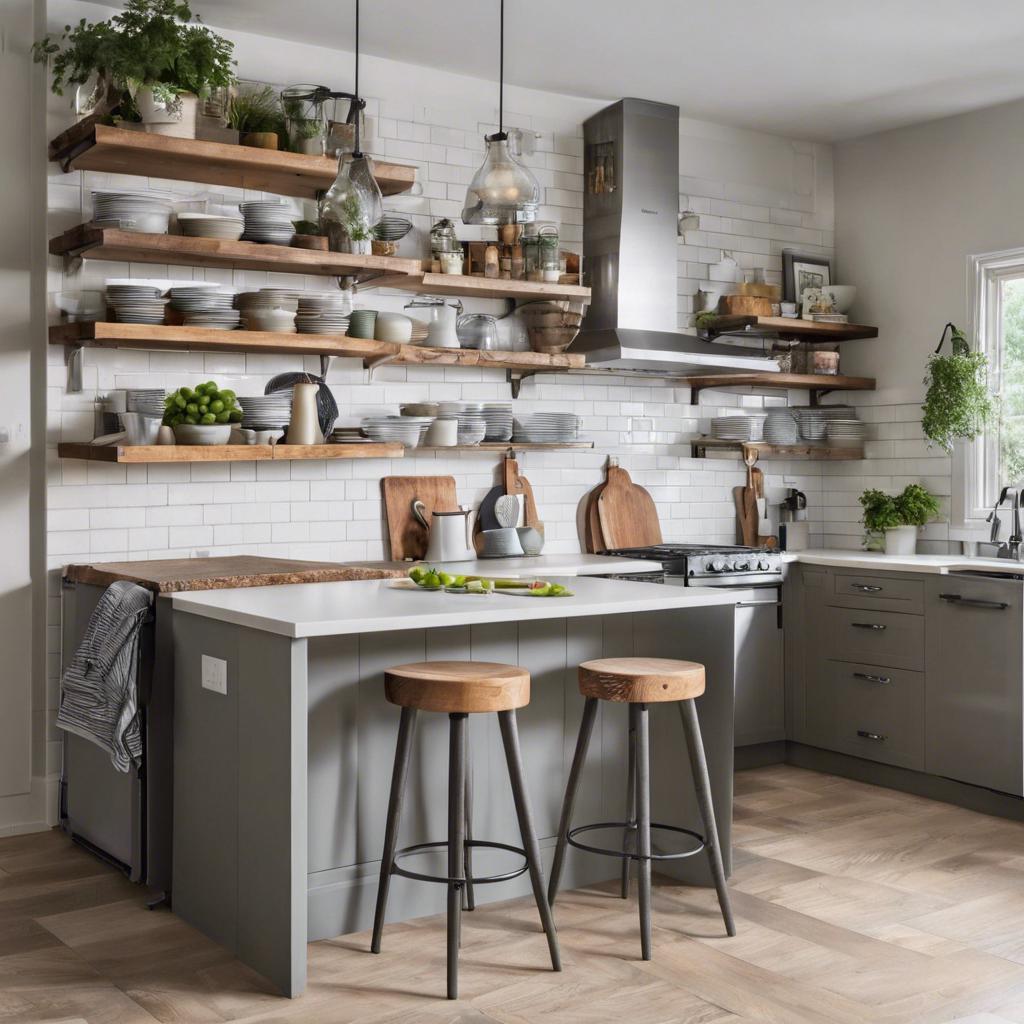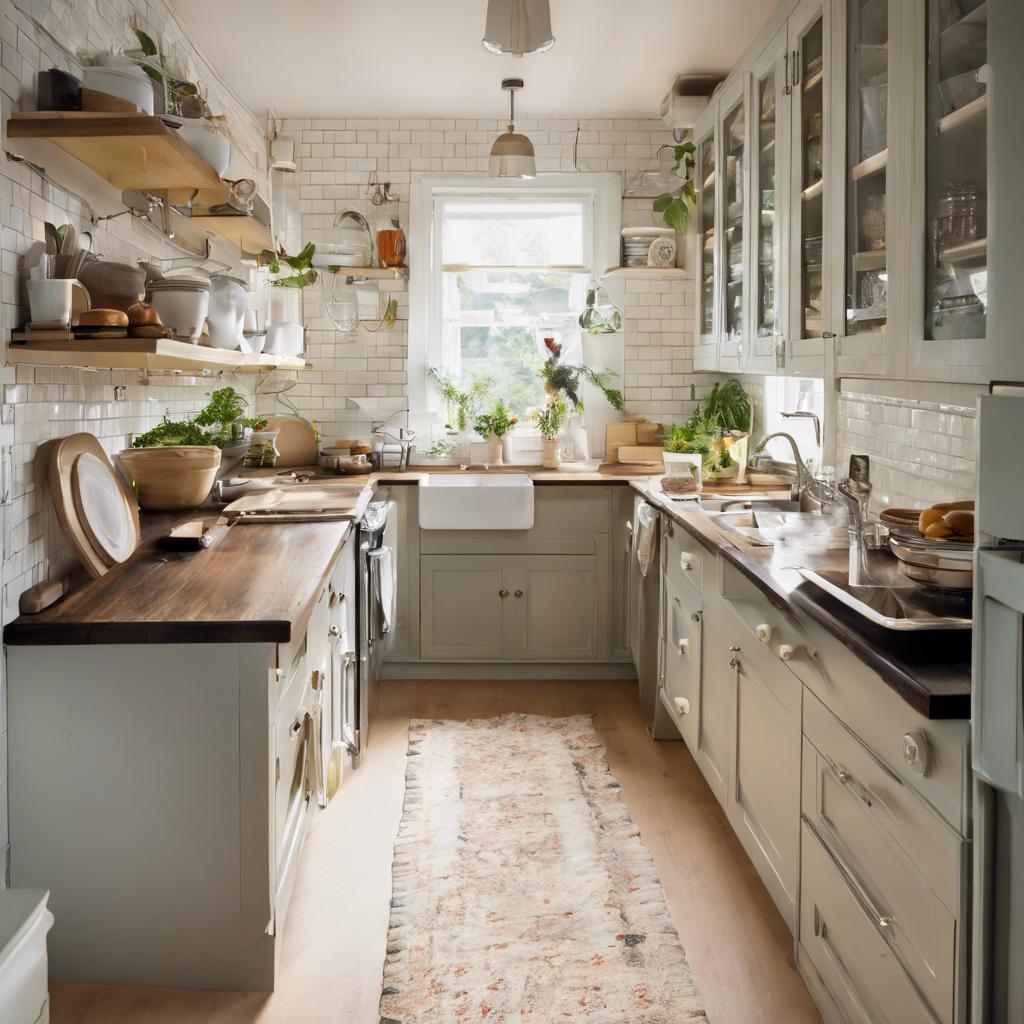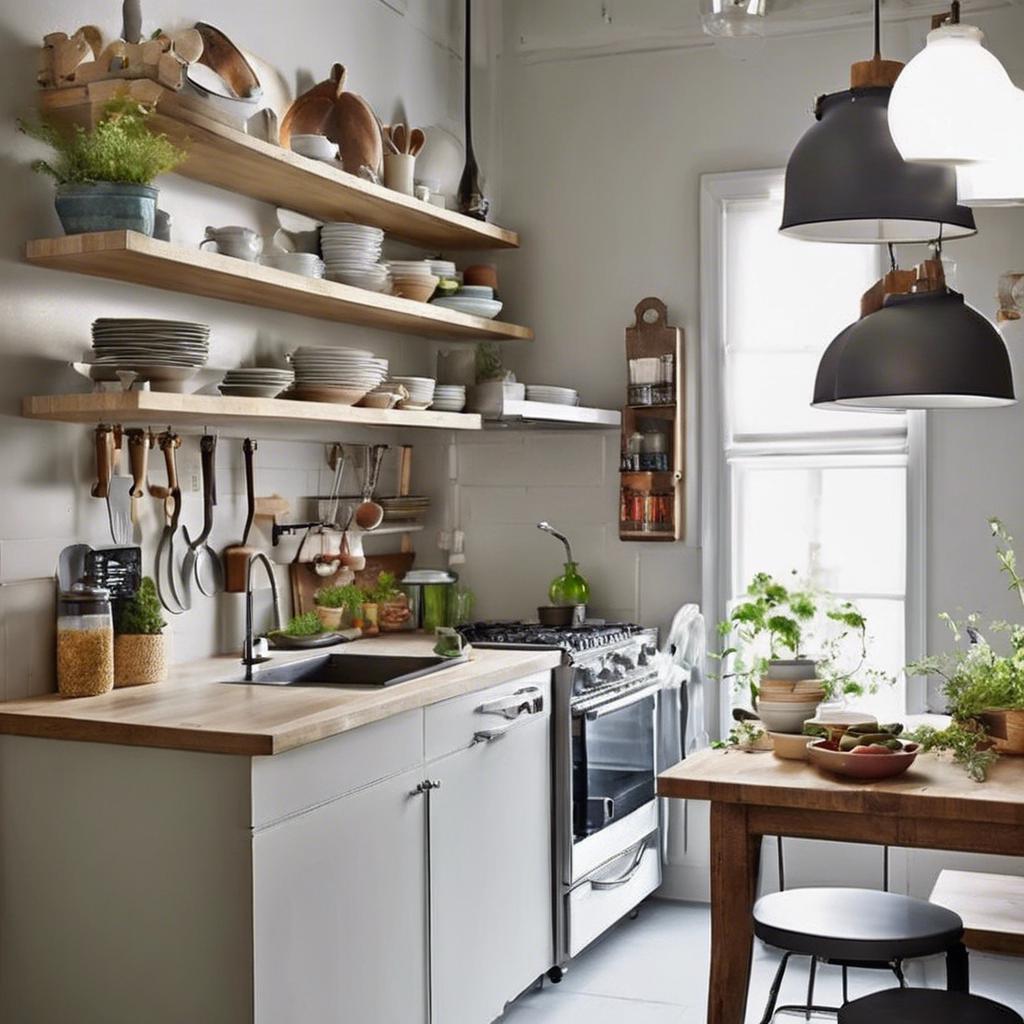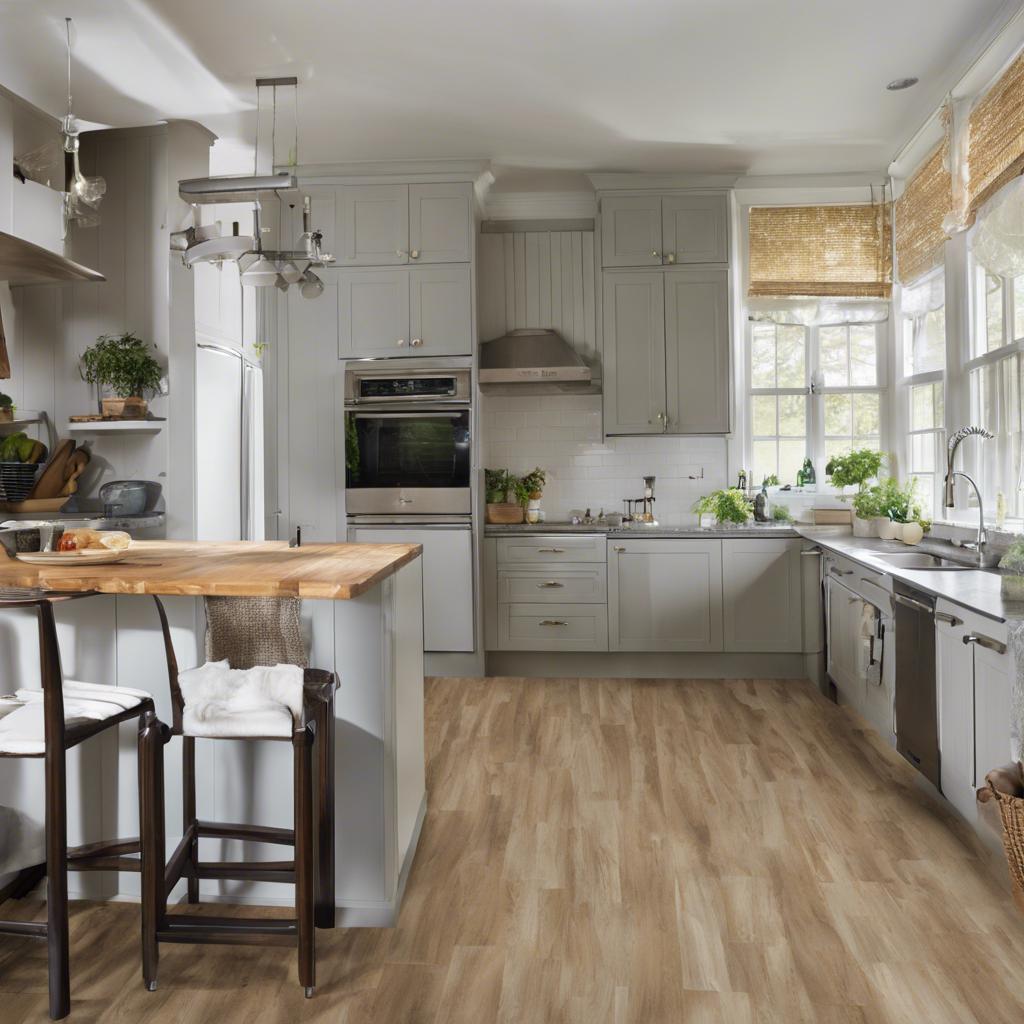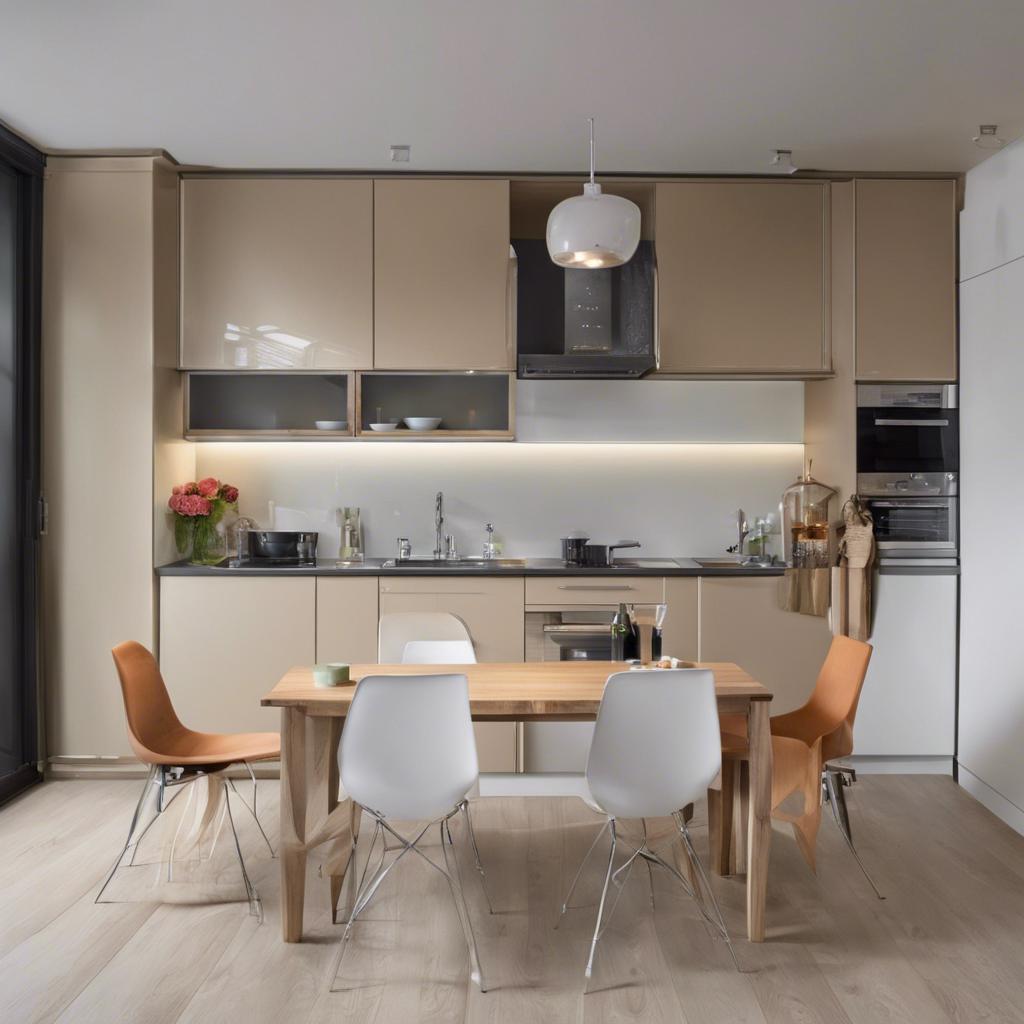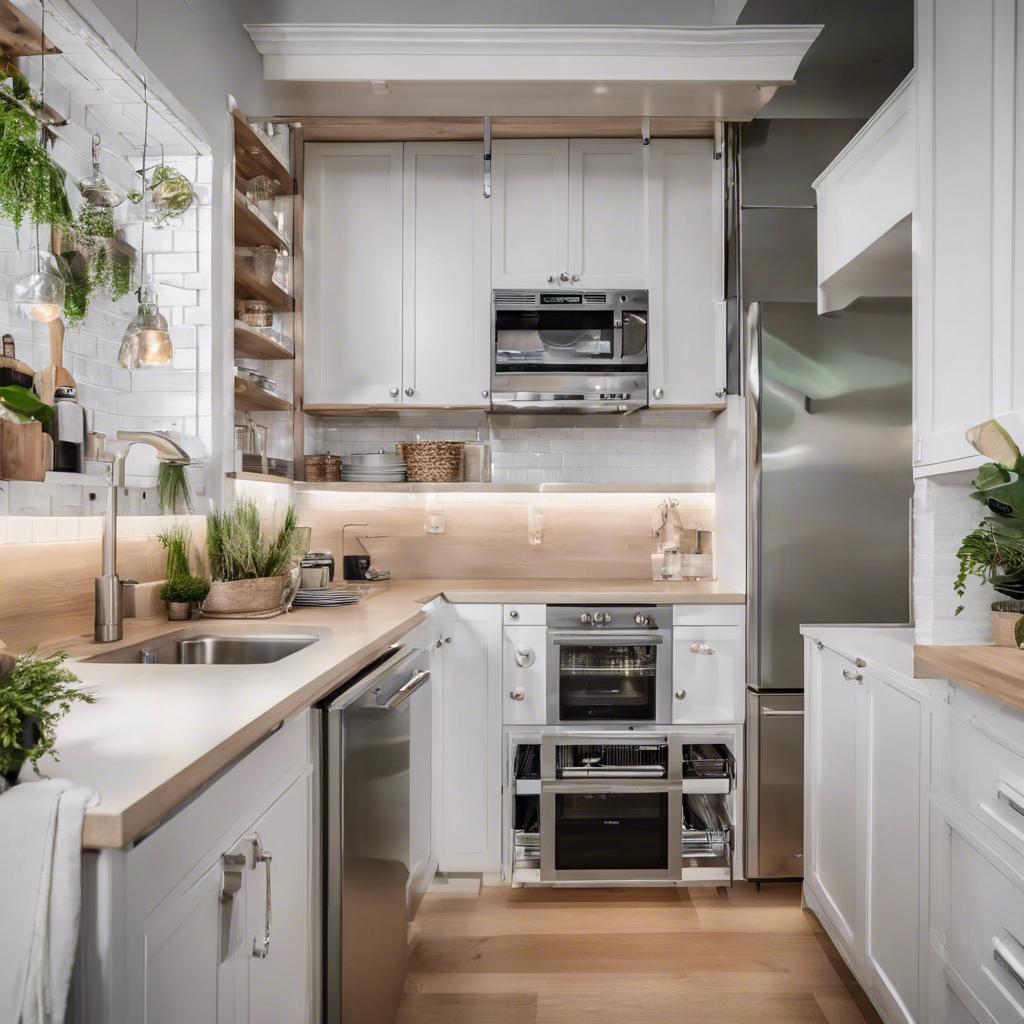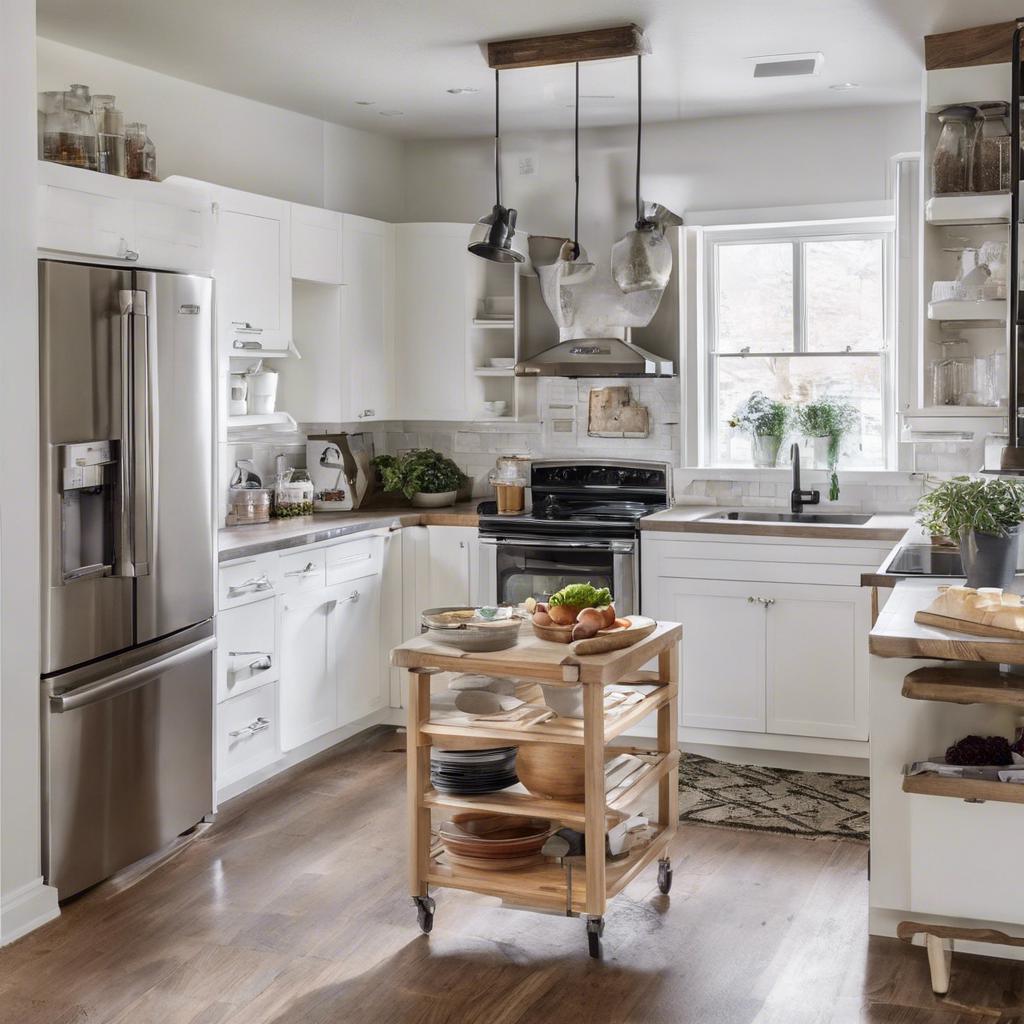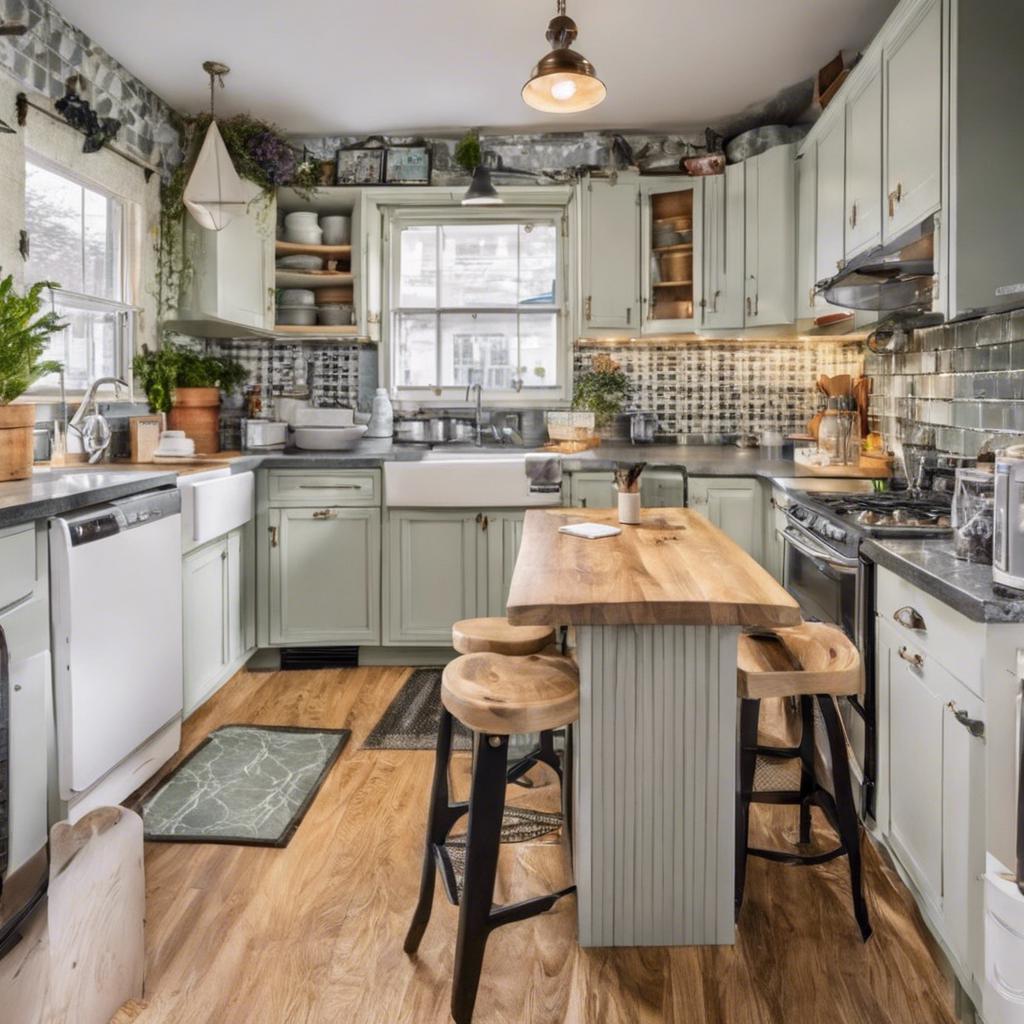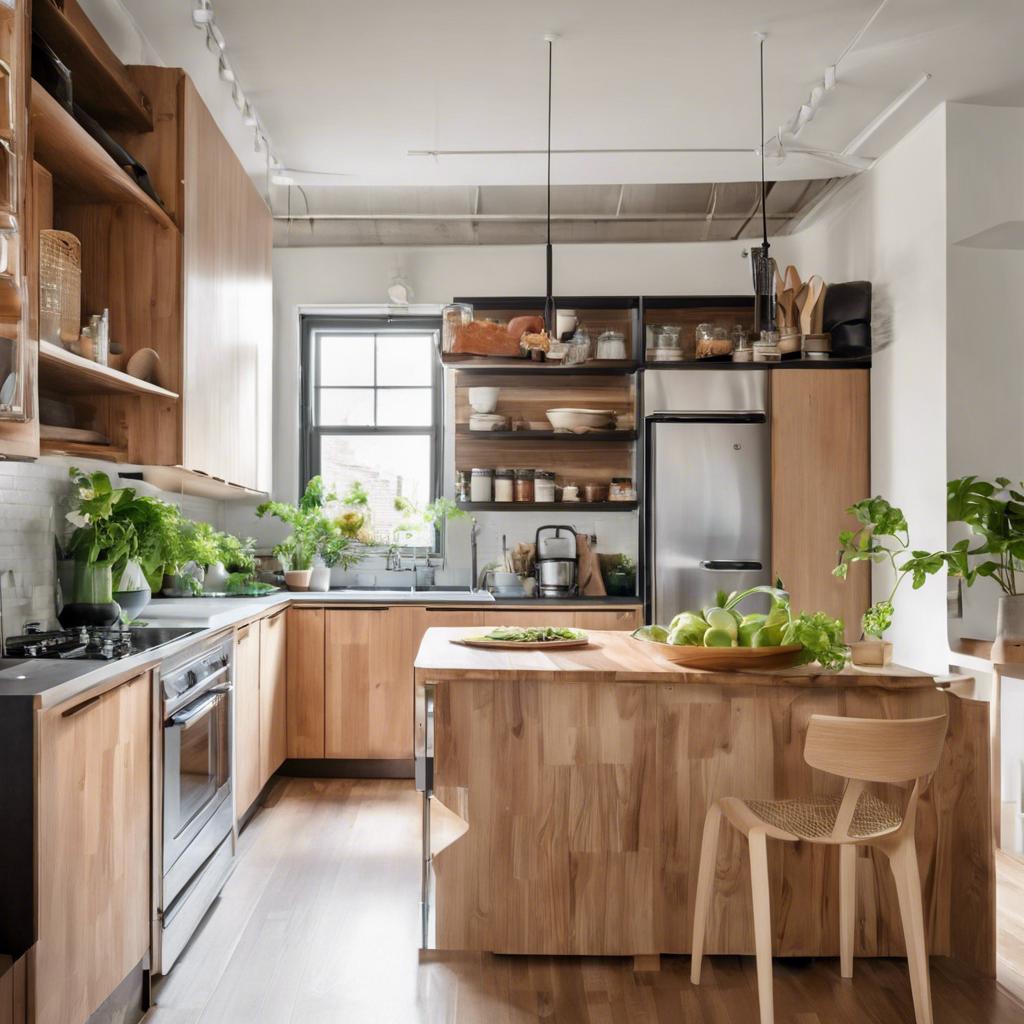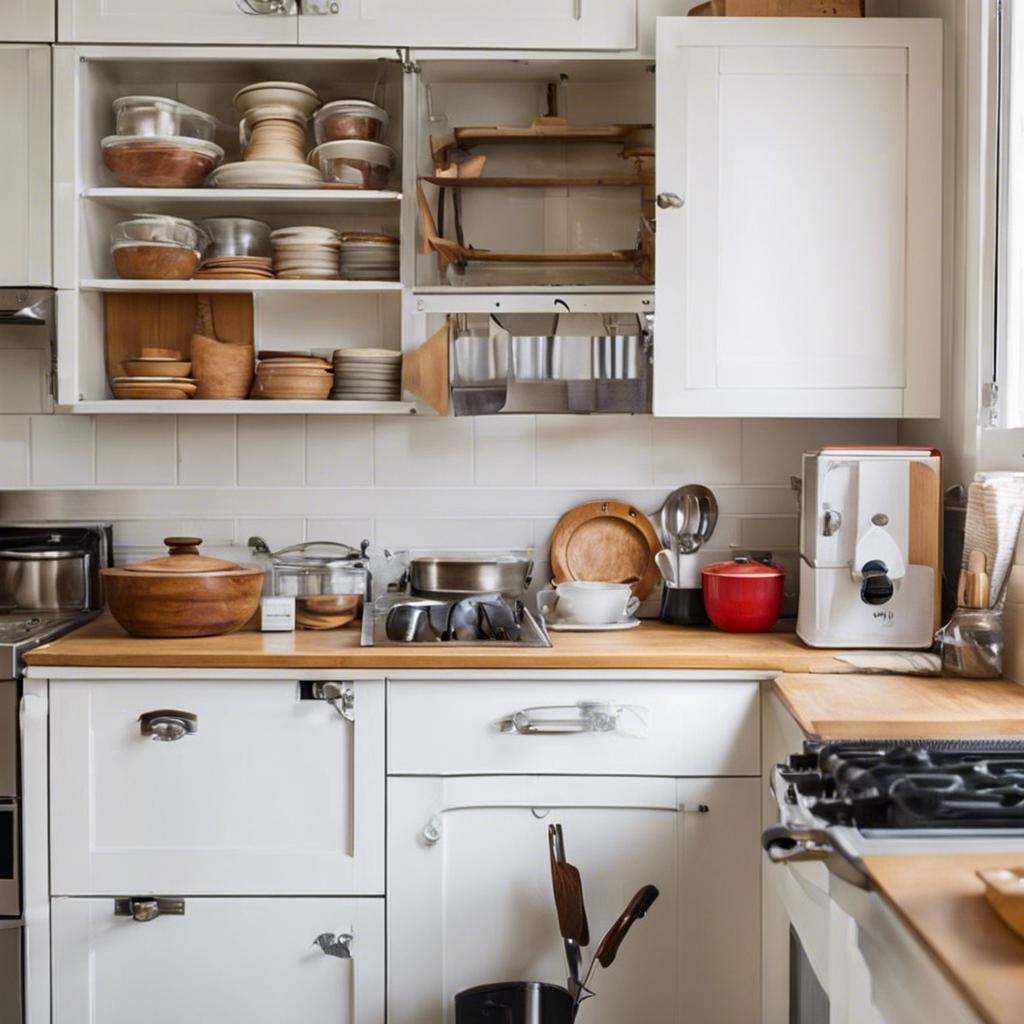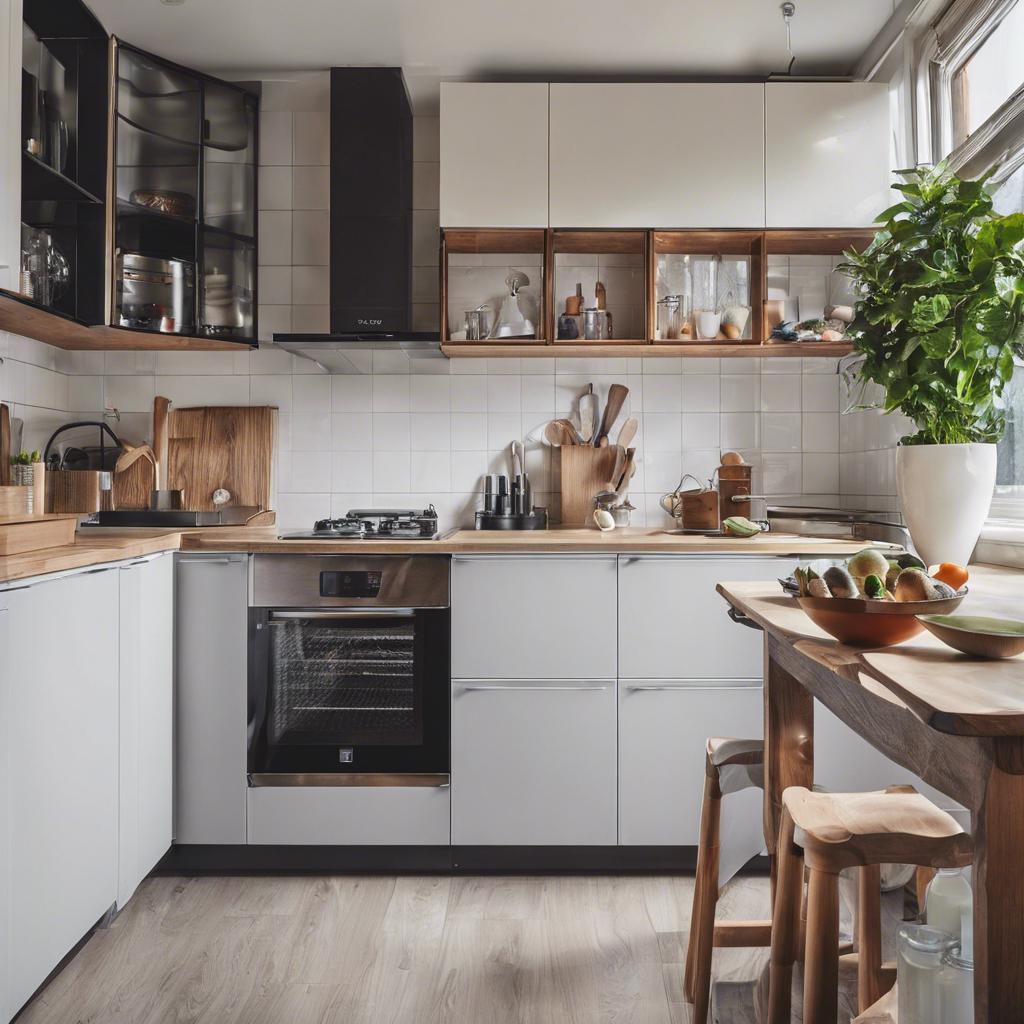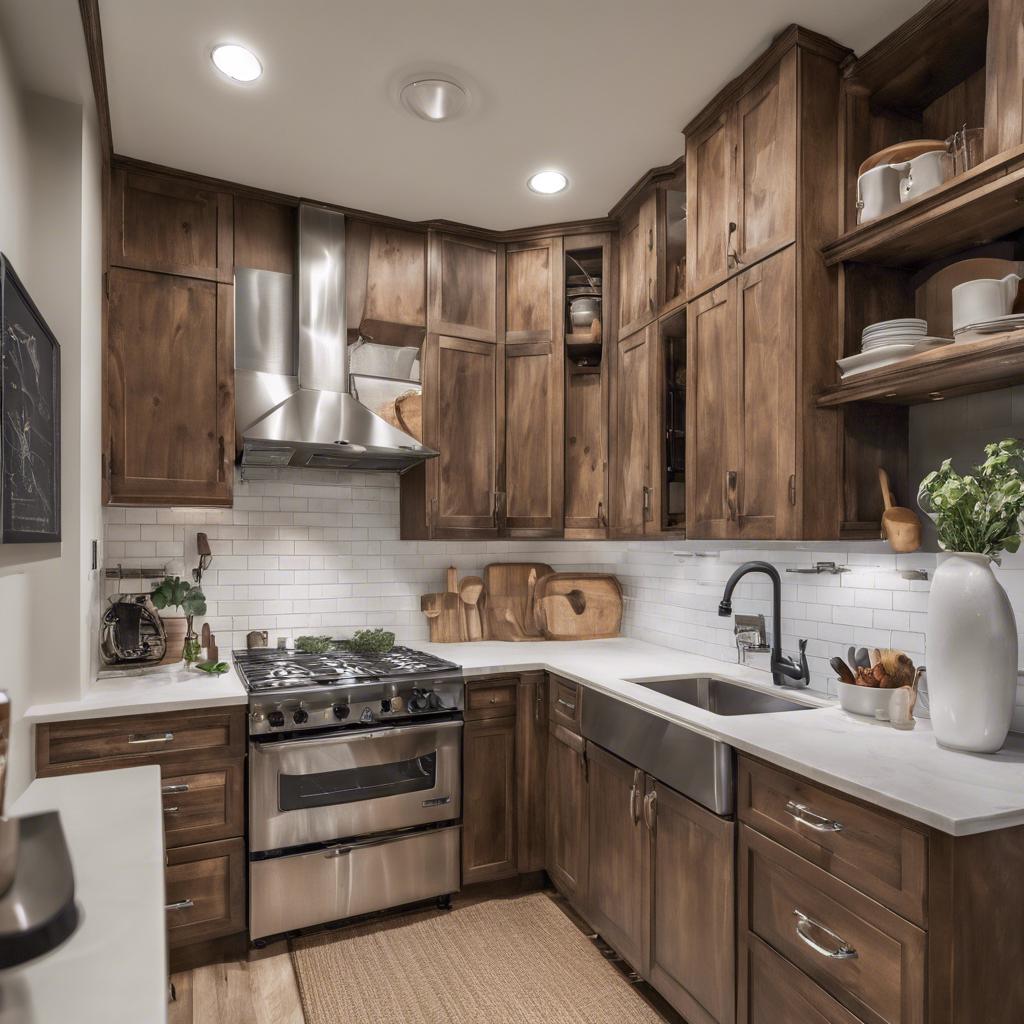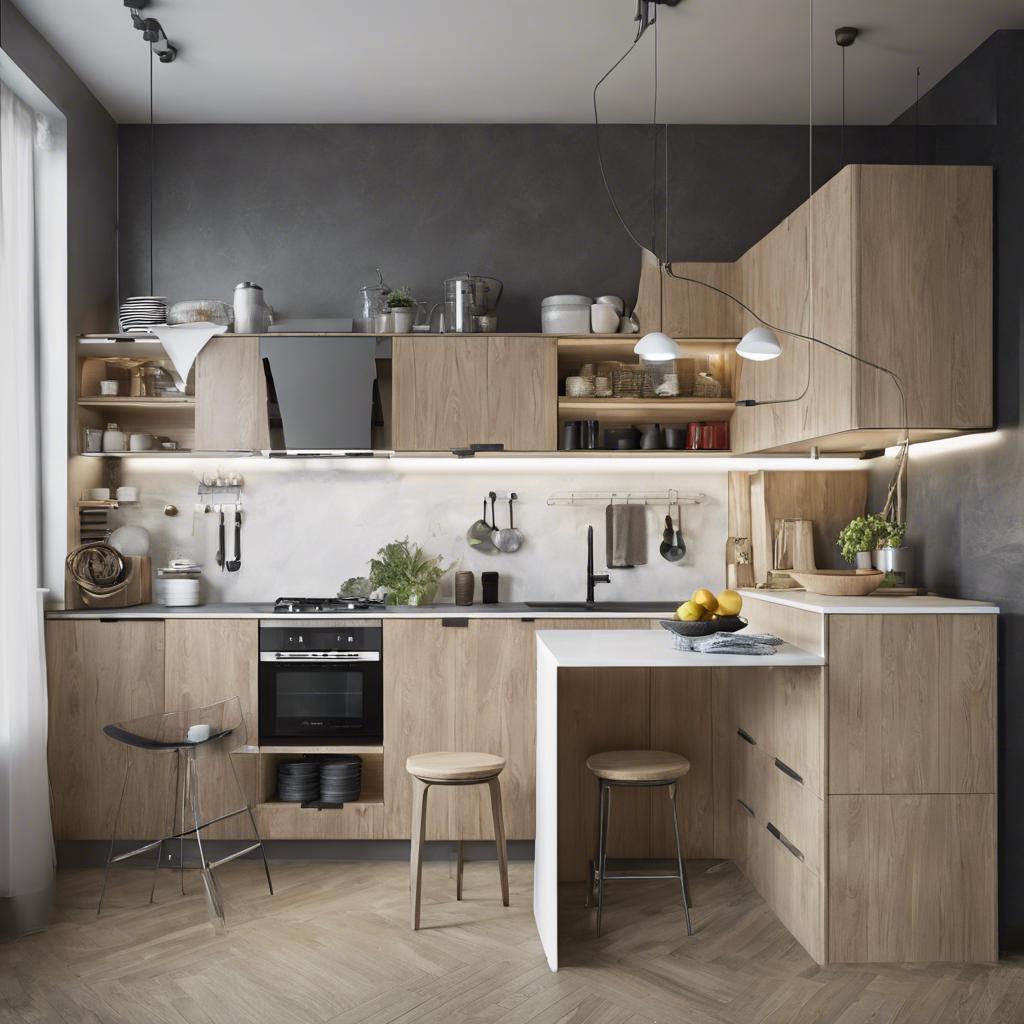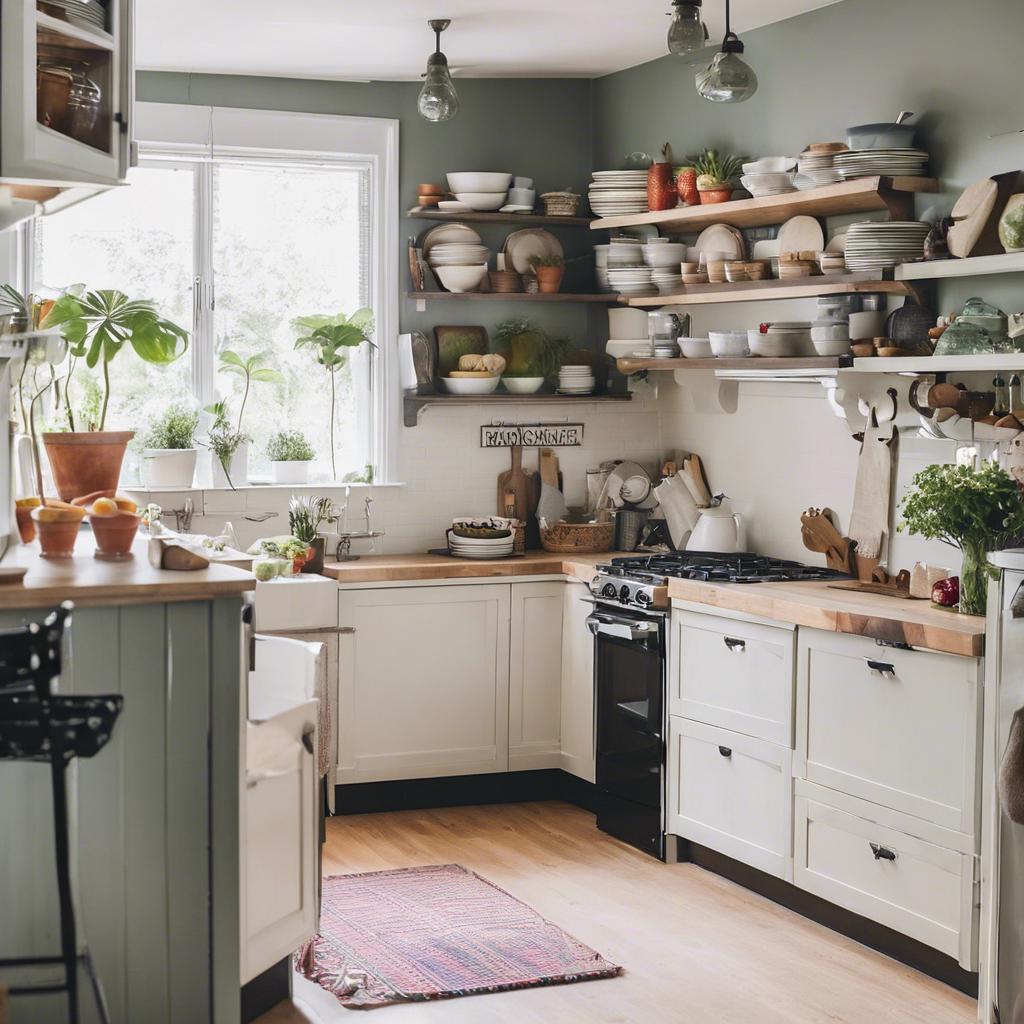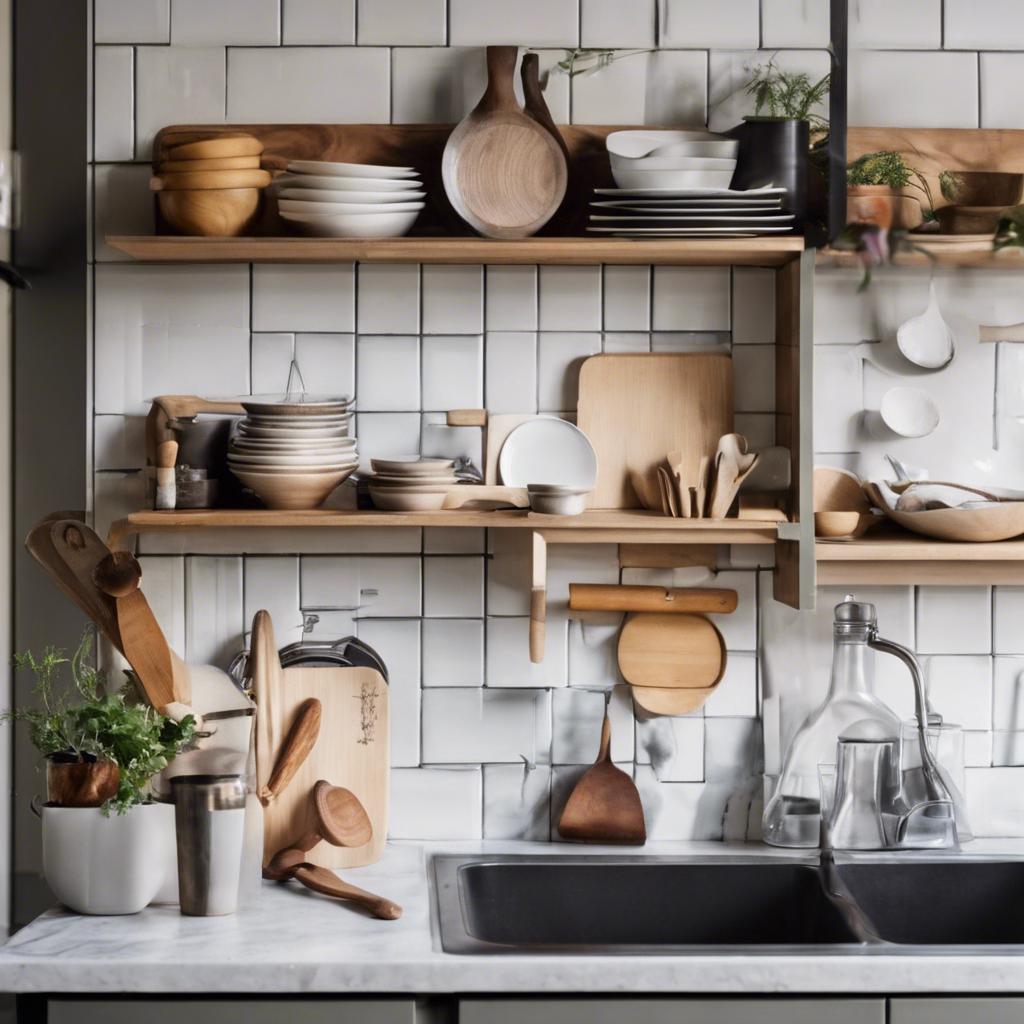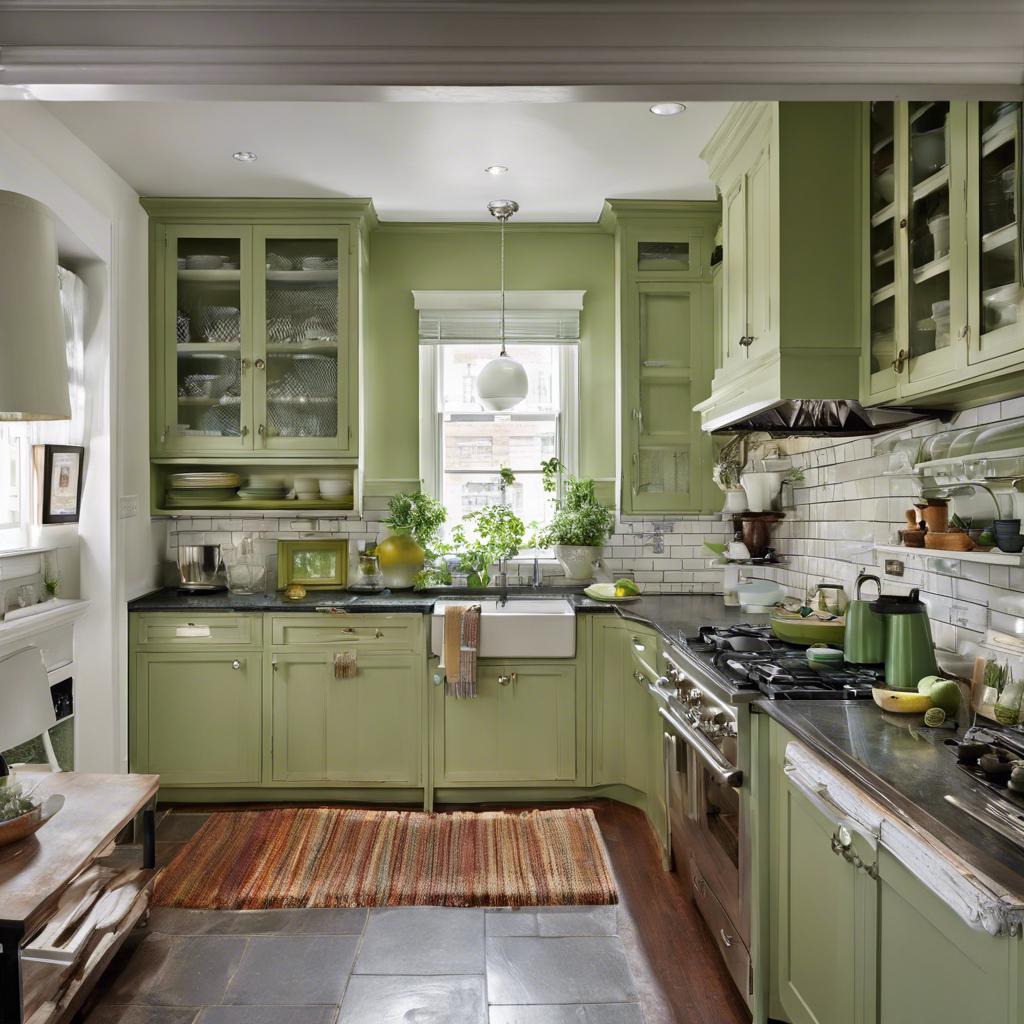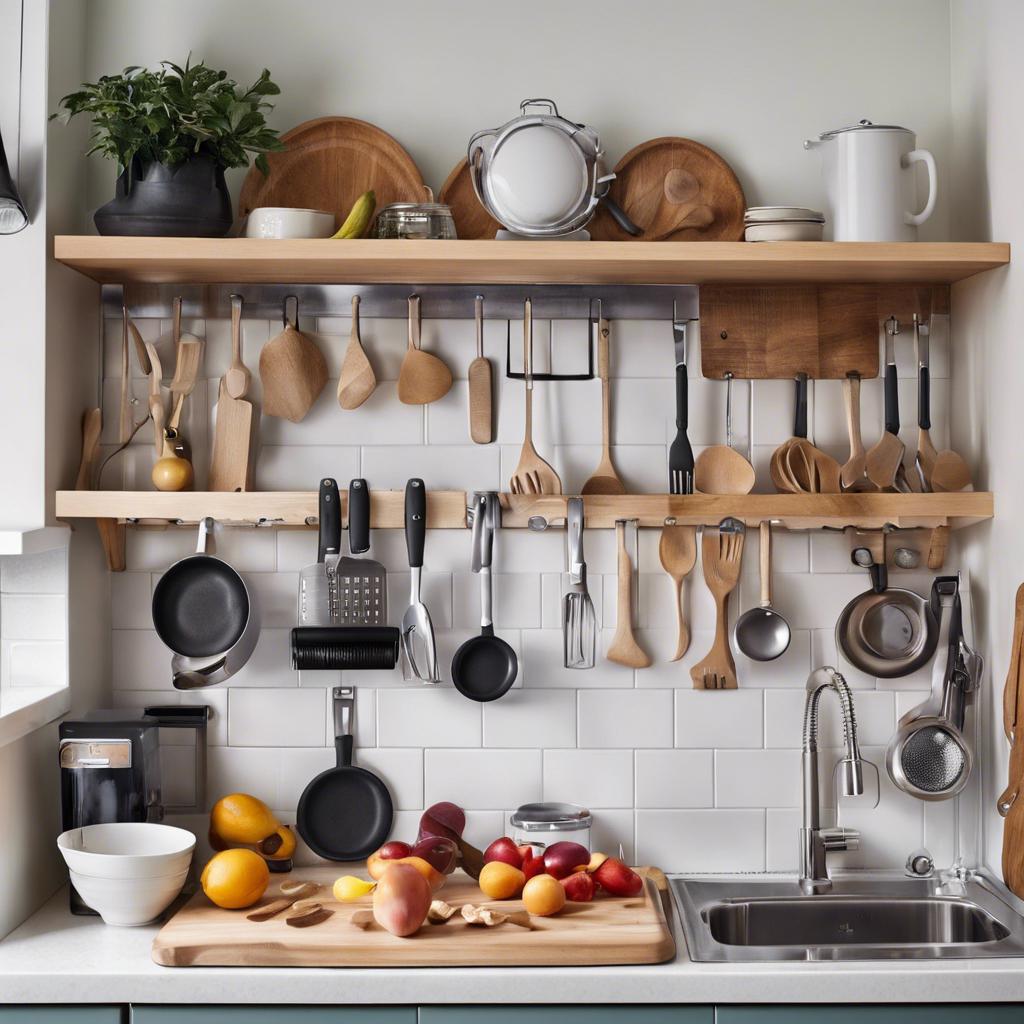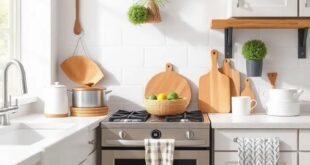In the world of culinary creativity, the kitchen stands as the heart of the home—a space where flavors mingle and memories are crafted. However, not every cooking sanctuary boasts abundant square footage; many of us face the delightful challenge of maneuvering within small kitchen spaces. But fear not, for maximizing style and functionality in these compact areas is not just a dream; it’s a craft that can elevate both your cooking experience and the aesthetic of your home. In this exploration, we will uncover innovative design tips and clever storage solutions that harmonize beauty with practicality. From multi-functional furniture to smart organization strategies, let’s embark on a journey to transform your petite kitchen into a chic haven that expertly balances elegance and efficiency. Prepare to discover how every inch can reflect your personal style while serving your culinary ambitions.
Exploring the Essentials of a Small Kitchen Design
Designing a small kitchen requires a balance of aesthetics and practicality, where every inch of space matters. When planning your layout, consider utilizing multifunctional furniture and built-in appliances that save space while enhancing style. Open shelving can visually expand the room’s perception, allowing for an airy feel while displaying beautiful dishware or solid storage solutions. Incorporate light colors in your design—pale cabinetry and bright countertops can lighten up the space, making it feel larger. Additionally, using mirrored backsplashes or glass-front cabinets can create depth, resulting in an illusion of spaciousness.
Storage solutions play a vital role in any compact kitchen. Explore options such as pull-out drawers, corner cabinets, and hanging pot racks to maximize existing space. Look into vertical designs, like tall cabinets or built-in pantry units that utilize the height of the walls effectively. Consider creating a central island or a slim breakfast bar that not only serves as an additional work surface but also as a social hub. Keep the design cohesive by choosing a consistent color palette and materials that reflect your personal style while remaining practical.
Embracing Minimalism for a Stylish Small Kitchen
Embracing a minimalist approach in your small kitchen can transform it into a haven of simplicity and elegance. The key is to prioritize functionality while maintaining an aesthetically pleasing environment. Start by selecting a few essential items that serve dual purposes, such as a cutting board that doubles as a serving tray, or sleek, stackable pots and pans that can be stored neatly. This not only reduces visual clutter but also maximizes the available space, allowing you to create a seamless workflow as you navigate through your cooking tasks.
Incorporating a cohesive color palette can also enhance the minimalist vibe and make your kitchen feel larger. Consider using light hues for cabinetry and countertops to reflect natural light, while adding a splash of color through carefully chosen accessories like dish towels or a potted herb. Additionally, utilizing open shelving can elegantly highlight your favorite kitchenware, while maintaining a tidy atmosphere. Here are some tips to keep in mind:
- Choose multifunctional furniture pieces, such as an island that offers both storage and additional prep space.
- Incorporate vertical storage solutions to draw the eye upward and create the illusion of height.
- Be selective with decorations; one or two statement pieces can be more impactful than cluttering surfaces.
Smart Storage Solutions for Small Kitchen Spaces
Don’t overlook the vertical space available; installing shelves up high can store items that are seldom used while keeping your countertops clear for meal preparation. Creating an organized pantry can also make a significant difference, so use stackable bins and clear containers to maintain visibility and accessibility of your ingredients. A sliding door cabinet or open shelving can offer a sense of openness while giving you easy access to your kitchen essentials. With a few thoughtful additions, your small kitchen can become a hub of efficiency and charm.
Color Palettes That Elevate Small Kitchen Aesthetics
Transforming a small kitchen into a stylish and functional space begins with the right color palette. Consider soft pastels like mint green, pale yellow, or blush pink to create an airy feel. These shades promote a sense of openness and tranquility while allowing natural light to bounce around the room. For a more contemporary look, opt for a monochromatic scheme using various shades of gray or taupe. This not only adds depth but also offers a sleek and sophisticated backdrop for your kitchen essentials. Pair these palettes with contrasting accents—think dark cabinetry against light walls—to make features pop without overwhelming the space.
To further refine your small kitchen’s aesthetic, explore the timeless appeal of neutrals with bold undertones. A combination of cream, beige, and deep navy can strike the perfect balance between warmth and drama. Incorporating textured elements, such as a rustic wooden countertop or a glossy tile backsplash, can highlight your chosen colors while adding visual interest. To help you visualize these combinations, check out the table below for popular palettes and their suggested applications:
| Color Palette | Suggested Features |
|---|---|
| Soft Pastels | Cabinetry, Backsplash, Accessories |
| Monochromatic Grays | Countertops, Fixtures, Walls |
| Neutrals with Navy | Flooring, Accents, Updates |
The Power of Lighting in Small Kitchen Environments
In a small kitchen, lighting plays a crucial role in both aesthetics and functionality. A well-illuminated space can make even the coziest kitchen feel larger and more inviting. Natural light is the most desirable, so consider maximizing window exposure with sheer curtains that allow sunlight to pour in. For evenings or darker days, blend various lighting sources to create a warm, layered effect. Key elements include:
- Task lighting: Focused lights above work areas like countertops and stoves can enhance visibility and safety.
- Ambient lighting: Soft overhead fixtures can set an inviting mood, perfect for gathering and entertaining.
- Accent lighting: Highlighting shelves or decorative items with LED strips adds character and depth.
Color temperature also influences the feel of the space. Warmer hues tend to create a cozy atmosphere, while cooler tones can lend a modern edge. Pay attention to fixture styles that complement your kitchen’s design. Consider incorporating a mix of styles, like sleek pendants combined with classic recessed lights, to enhance visual interest. Below are some popular options:
| Fixture Type | Description |
|---|---|
| Pendant Lights | Perfect for islands or dining areas; they provide both task and ambient lighting. |
| Under-Cabinet Lighting | Illuminates countertop space, making meal prep easier while adding a touch of elegance. |
| Wall Sconces | Adds character to wall spaces and creates a soft glow without taking much floor space. |
Selecting Multi-Functional Appliances for a Small Kitchen
In a small kitchen, where every inch counts, selecting multi-functional appliances can transform your cooking experience without overcrowding your space. Look for devices that not only perform essential tasks but also incorporate sleek designs that complement your kitchen aesthetics. Appliances like toaster ovens that can also air fry or pressure cookers that double as slow cookers are great additions. Smartness and flexibility are key, so consider options that allow for programming or come with multiple settings, suiting various cooking styles. Place an emphasis on compact designs that can be easily stored away when not in use to maintain a tidy kitchen feel.
When evaluating which appliances to invest in, prioritize those that offer the most versatility. Choose from the following categories:
- Combination Ovens – Bake, broil, and steam all in one unit.
- Induction Cooktops – Portable and energy-efficient, ideal for quick meals.
- Blender/Food Processor Systems – From smoothies to meal prep, all in one
- Multi-cookers – Sauté, pressure cook, or slow cook with a single device.
| Appliance | Functions | Space-Saving Feature |
|---|---|---|
| Toaster Oven | Bake, Broil, Air Fry | Stackable design |
| Multi-Cooker | Pressure Cook, Slow Cook, Steam | Compact size |
| Blender/Food Processor Combo | Blend, Chop, Mix | Interchangeable parts |
Incorporating Open Shelving in Small Kitchen Designs
Open shelving is a fantastic way to enhance both style and functionality in small kitchens, providing an opportunity to showcase your favorite dishware and decorative items while maximizing precious vertical space. By incorporating open shelves, you can create an airy and uncluttered look that can make any kitchen feel more spacious. To make the most of this design element, consider the following:
- Highlighting Colors: Use vibrant dishware or stylish containers to infuse personality into your kitchen.
- Minimalist Approach: Choose a few key pieces to display, keeping the shelves from looking overcrowded.
- Floating Shelves: Install shelves that ‘float’ to give the illusion of additional space while providing functional storage.
- Mixing Materials: Combine different materials, like wood and metal, to create visual interest and depth.
When planning your shelving, it’s important to strategically position items for both aesthetics and ease of access. Create a balanced layout by grouping items by size or color while ensuring heavier items are placed on lower shelves. Additionally, consider adding under-shelf lighting to illuminate your display and enhance the ambiance of your kitchen. Here’s a simple layout idea:
| Item | Placement | Purpose |
|---|---|---|
| Large pots | Bottom shelf | Easy access |
| Colorful dishes | Middle shelf | Visual appeal |
| Herb planters | Top shelf | Natural decor |
Harmonizing Small Kitchen Layouts for Efficiency
In small kitchen spaces, every inch counts, and achieving a harmonious layout can significantly enhance both practicality and aesthetics. Consider implementing an open shelving system to display beautiful dishware or cookbooks while maximizing vertical space. This not only adds a decorative touch but also keeps essential items within easy reach. Another effective strategy involves utilizing multi-functional furniture, such as a kitchen island that doubles as a dining table, providing additional workspace and seating without overwhelming the area.
Additionally, incorporating smart storage solutions can transform the efficiency of a compact kitchen. Use drawer dividers for organized utensil storage, and vertical racks for spices to allow you to utilize hidden spaces effectively. Organizing items in color-coded containers can also make the kitchen feel more unified and aesthetically pleasing. Here’s a quick look at essential small kitchen elements that can enhance your layout:
| Element | Function |
|---|---|
| Open Shelving | Display items and save counter space |
| Multi-functional Island | Workspace and dining area in one |
| Vertical Storage | Maximize space efficiency |
| Color-coded Containers | Aesthetic organization of pantry items |
Creative Use of Vertical Space in Small Kitchens
In small kitchens, where every inch counts, vertical space becomes a canvas for both creativity and utility. By embracing the upward potential of your walls, you can significantly enhance your kitchen’s functionality while adding unique design elements. Consider installing open shelving that showcases not only your essentials but also your favorite cookbooks and decorative items. Aiming for consistency in color and style gives an organized look, while pops of color can highlight certain items and create visual interest. Incorporating magnetic strips for knives and spice jars on walls not only frees up counter space but also adds a modern touch to your kitchen’s aesthetics.
Another innovative approach is to utilize the undersides of cabinets. Here, you can hang hooks for pots and pans or install small racks for frequently used utensils, keeping them within easy reach. For those with a flair for design, wall-mounted planters can introduce greenery into your cooking space, enhancing air quality and providing fresh herbs at your fingertips. Adding a high, narrow pantry or a tall cabinet can significantly increase storage options without consuming valuable floor space. Whether you opt for sleek, frameless designs or rustic wooden finishes, the key is to blend functionality with your personal style effortlessly.
Choosing the Right Flooring for a Small Kitchen
When selecting flooring for a compact kitchen, it’s essential to strike a balance between style and practicality. The right choice not only complements your overall design but also withstands the wear and tear of everyday cooking. Opt for light-colored materials to create an illusion of space, making the kitchen feel larger than it is. Consider options such as:
- Vinyl: Available in various patterns, easy to clean, and comfortable underfoot.
- Laminate: Durable and versatile, offering a wide range of finishes that mimic wood or tile.
- Tile: A timeless choice, providing excellent longevity and a plethora of design options.
Additionally, the flooring should be resistant to moisture and spills, making maintenance a breeze. Think about textures as well; smooth surfaces can bounce light around, creating an airy feel, while subtle patterns can add depth without overwhelming the space. Here’s a quick comparison of some popular flooring materials:
| Material | Durability | Maintenance | Style Options |
|---|---|---|---|
| Vinyl | High | Low | Extensive |
| Laminate | Medium | Medium | Varied |
| Tile | Very High | Medium | Traditional to Modern |
Integrating Dining Areas in Compact Small Kitchen Layouts
When space is at a premium, merging dining areas within compact kitchen layouts can transform functionality and create a cozy atmosphere. Smartly designed furniture is key; consider multi-functional pieces that offer storage solutions alongside dining capabilities. A small, round table can encourage intimate meals while saving space, coupled with sleek chairs that can be tucked away when not in use. Think about utilizing vertical space as well, with shelves or wall-mounted tables that serve dual purposes—dining space by day and a cooking prep area by night.
Another innovative approach is to incorporate a breakfast bar along a kitchen island or countertop, providing a casual dining experience. This arrangement not only enhances aesthetics but also allows for seamless interaction between cooking and dining activities. Consider adding decorative elements like hanging plants or vibrant table settings to infuse personality into the area. Additionally, using coherent color palettes for dining chairs and kitchen fixtures creates a unified look, making the space feel larger and more inviting.
Designing a Small Kitchen with Hidden Features
To create a small kitchen that is both stylish and functional, consider incorporating hidden features that enhance versatility without sacrificing aesthetics. Pull-out cabinets and hidden garbage bins can declutter countertops and maximize space, while failure to overlook corners can be addressed by using corner cabinets that make the most of every inch. Another great idea is to integrate appliances into cabinetry, effectively camouflaging them when not in use. This allows the kitchen to maintain a sleek and uniform appearance, blending seamlessly with the surrounding decor.
Moreover, element selection plays a vital role in this design approach. Opt for magnetic knife strips to eliminate counter bust and create an organized look while allowing easier access when cooking. Additionally, foldable tables or drop-leaf countertops can provide extra space for meal prep or dining, only appearing when needed. Combine these hidden features with well-placed lighting solutions, such as under-cabinet LEDs, to highlight your stylish design and ensure that your small kitchen remains inviting and functional.
Utilizing Corner Spaces in Small Kitchen Functionalities
When designing your corner, opt for light colors and clever lighting to enhance the illusion of space. Strategic use of mirrors can also create a more expansive feel. A thoughtfully designed corner can serve as a mini pantry, which could include:
- Stackable bins: Perfect for dry goods.
- Tiered spice racks: Maximizes vertical space.
- Magnetic strips: Ideal for keeping metallic tools within reach.
Additionally, consider adding a small table or a fold-down counter in the corner, providing a perfect spot for casual dining or extra prep space. As you utilize these often-overlooked areas, the kitchen not only becomes more functional but also a reflection of your personal style.
Personalizing Your Small Kitchen with Unique Décor
Add character to your small kitchen by incorporating elements that reflect your personal taste. Unique décor pieces can transform your cooking space from mundane to stylish without overwhelming it. Consider accessorizing with a collection of colorful plates or artisanal cookware displayed on shelves. Hanging a few framed prints or your favorite recipes can create an inviting atmosphere while also giving functionality to the walls. Here are some ideas to inspire your personal touch:
- Vintage Finds: Scour local flea markets for quirky items like old-fashioned tin signs or retro kitchen gadgets.
- Personalized Art: Create or commission a piece of art that resonates with your culinary journey.
- Seasonal Decor: Switch out decorative items based on the season to keep your kitchen fresh and engaging.
Lighting is another essential element in enhancing the ambiance of your small kitchen. Choosing unusual light fixtures or using string lights can make a significant impact on the overall décor. If you have open shelving, consider adding decorative jars or plants to create dimension and interest. A well-placed simple table can serve as a focal point while providing extra storage and preparation space. Here’s a quick table to visualize your options:
| Décor Element | Functionality | Style Impact |
|---|---|---|
| Wall Art | Personal expression | Visual interest |
| Hanging Plants | Air purification | Organic touch |
| Open Shelving | Easy access | Showcase style |
Sustainable Practices for Eco-Friendly Small Kitchens
To further cultivate an eco-friendly atmosphere, prioritize recycling and composting stations integrated within your kitchen design. This can be achieved through compact bins hidden in cabinetry or pull-out drawers. Choose non-toxic, biodegradable cleaning products to maintain the kitchen’s aesthetic while ensuring safety for your family and the planet. Lastly, implementing a herb garden on your windowsill not only brings freshness to your meals but also promotes biodiversity in urban settings.
Strategies for Streamlining Small Kitchen Clutter
In small kitchens, every inch counts. Utilizing vertical space can make a world of difference when trying to minimize clutter. Consider installing open shelves above your countertops to keep everyday items within reach while maintaining an airy feel. You can also use magnetic strips for knives and other metal utensils, freeing up drawer space and making kitchen tools easy to grab. Incorporating multi-functional furniture, like a kitchen island with built-in storage or a collapsible dining table, can also help maximize utility without overwhelming the space.
Organization is key in managing small kitchen clutter. Start by categorizing items according to their frequency of use, and utilize clear containers to store pantry staples, making it easy to see what you have at a glance. Here’s a simple guide to decluttering your kitchen essentials:
| Category | Action |
|---|---|
| Utensils | Use a drawer organizer or a wall-mounted solution. |
| Cookware | Stack pots and pans with lids in a single location. |
| Food Storage | Invest in nesting containers for efficient space usage. |
| Small Appliances | Designate a ‘use only’ zone on the counter for essentials. |
By applying these strategies, you can transform your small kitchen into a stylish and functional haven, ensuring that clutter is kept at bay while allowing your personality to shine through in your decor.
Tips for Maintaining Cleanliness in Small Kitchens
To keep your compact kitchen space tidy and functional, consider implementing daily habits that encourage cleanliness. Begin by establishing a routine that includes wiping down surfaces after each meal preparation. Use a damp cloth with a gentle cleaner to eliminate crumbs and spills, preventing any buildup that can attract pests. Emphasize organized storage by using vertical space; install shelves or use stackable containers for easy access to kitchen essentials without cluttering counters.
Investing in multi-functional tools can also aid in maintaining a clean environment. For instance, opt for utensils that serve multiple purposes, such as measuring cups that also function as mixing bowls. This not only minimizes the number of items to wash but also streamlines your cooking process. Additionally, consider using a small kitchen caddy to keep your essentials like oil, spices, and utensils together; it makes cleaning up a breeze. Lastly, schedule a thorough clean out of your pantry and fridge regularly to discard expired items, ensuring your kitchen remains a pleasant and hygienic space.
Maximizing Counter Space in a Small Kitchen Design
In a small kitchen, every inch of counter space is valuable, and utilizing it effectively can significantly enhance your culinary experience. One clever solution is to incorporate multi-functional furniture. Consider a kitchen island on wheels; it can serve as a prep station when needed and be tucked away or moved aside when not in use. Additionally, incorporating pull-out shelves or foldable tables can help you maintain an open flow while offering extra work surfaces when you’re whipping up a gourmet meal. Don’t forget the vertical potential! By installing overhead racks or magnetic strips, you can keep your most-used utensils within easy reach while freeing up the workspace below.
Another way to optimize your kitchen layout is by implementing smart storage solutions that blend seamlessly with your decor. Look for drawer dividers, stackable containers, and cabinets with pullout trays to organize smaller appliances, dishes, and pantry items effectively. This not only keeps the counter tidy but also ensures vital tools and ingredients are quickly accessible when you need them. Here’s a simple guide to effective storage solutions for small kitchens:
| Storage Solution | Description |
|---|---|
| Wall-mounted Shelves | Great for displaying cookbooks and decorative items while freeing up counter space. |
| Under-sink Organizers | Maximize often-overlooked areas with compact double-decker sponges and cleaning supplies storage. |
| Lazy Susans | Perfect for corner cabinets, allowing easy access to pots, pans, and pantry items. |
Selecting the Best Materials for Small Kitchen Applications
When it comes to small kitchens, selecting the right materials can significantly enhance both style and practicality. Compactness is key, and opting for materials that maximize light reflection can make a space feel larger and more open. For instance, consider using glossy cabinetry finishes or light-colored countertops, as these elements can help brighten the room while providing a sleek aesthetic. Additionally, sustainable materials, such as bamboo or recycled composites, are not only eco-friendly but also add a modern touch to your kitchen design. Incorporating these materials allows for creative expressions without sacrificing functionality.
Durability should be a priority when selecting materials for small kitchen applications. Countertops need to withstand the rigors of daily use, so quartz or granite are excellent choices due to their resistance to staining and scratching. For flooring, consider options like vinyl and porcelain tiles, which are not only stylish but also water-resistant and easy to clean. Utilizing a mix of materials can add textural interest: think about open shelving made from reclaimed wood paired with sleek, metal accents. Below is a comparison of common materials you might use in your small kitchen renovation:
| Material | Benefits | Drawbacks |
|---|---|---|
| Quartz | Durable, non-porous, wide color range | Can be more expensive |
| Bamboo | Eco-friendly, lightweight, stylish | Can be prone to scratches |
| Vinyl | Water-resistant, easy maintenance | Less durable than hard flooring |
| Open Shelving | Creates visual openness, easy access | Requires regular upkeep and organization |
Creating an Inviting Atmosphere in a Small Kitchen
involves thoughtful design choices and smart use of space. Start by implementing warm colors and soft lighting to enhance the coziness of your kitchen. Consider using a palette of muted tones like cream, soft grey, or pastel shades that can make the area feel more expansive while maintaining warmth. Accentuating these colors with wooden elements—like open shelving or a reclaimed wood dining table—adds a touch of rustic charm and helps to create focal points that draw the eye. Plants, whether hanging or in pots, introduce life and freshness, making your kitchen feel more inviting.
Incorporating functional and stylish decor elements is essential in a small space. Utilize multi-functional furniture, such as a kitchen island with storage or a foldable table, to maintain flexibility while accommodating guests. Add personal touches with decorative items like stylish dishware or vintage kitchen tools displayed on open shelves. Introducing a clear organizational system ensures that everything has its place while still looking appealing. Consider these essential components for an inviting atmosphere:
- Soft Lighting: Use under-cabinet lights or pendant lamps.
- Color Palette: Choose light and warm colors.
- Greenery: Integrate herbs or decorative plants.
- Art and Decor: Feature culinary art or photos.
Balancing Form and Function in Small Kitchen Accessories
In the compact realm of small kitchens, every accessory must pull double duty, seamlessly blending aesthetics with practicality. Choosing items that harmonize with your kitchen’s overall design while serving a clear purpose is essential. Consider items that are visually appealing yet efficient in use, such as stylish utensil holders that also provide easy access to frequently-used tools. Opting for multi-functional gadgets, like a sleek cutting board that doubles as a serving platter, can help declutter countertops while elevating your cooking experience.
To illustrate the elegance of form meeting function, here are some key accessories that can transform your small kitchen into a cohesive space where design meets usability:
| Accessory | Functionality | Style Element |
|---|---|---|
| Magnetic Knife Strip | Free up counter space | Modern, minimalist design |
| Stackable Measuring Cups | Efficient storage | Colorful, playful look |
| Collapsible Kitchen Gadgets | Space-saving convenience | Trendy and compact |
| Stylish Mixing Bowls | Preparation and serving | Chic ceramic or glass finishes |
By selecting accessories that embody both form and function, you can create a kitchen that is not only efficient but also aesthetically pleasing. Investing in these thoughtfully designed items will enhance your culinary experience, ensuring that your small kitchen remains stylish and functional as you navigate your daily tasks.
Utilizing Color to Create Depth in Small Kitchens
One of the most effective ways to enhance the perception of space in small kitchens is through the strategic use of color. Lighter shades, such as soft whites, cool grays, and pastel tones, can reflect light and make a compact area feel larger and airier. Meanwhile, accentuating the space with deeper hues, like navy blue or forest green, can add contrast and intrigue, creating layered visual interest. Consider incorporating a two-tone approach where the upper cabinets are painted in a lighter color and the lower ones in a darker shade, producing the illusion of height while grounding the space.
Moreover, texture plays a pivotal role when combining colors in a small kitchen. Using textured surfaces like a deep-colored backsplash or patterned tiles can draw the eye, adding depth without overwhelming the area. You can also experiment with color in unexpected places—such as the interior of open shelves painted a bold color or a vibrant rug on the floor. Here’s a quick summary of effective color uses:
| Color Choice | Effect |
|---|---|
| Light Colors | Make spaces appear larger |
| Dark Colors | Add depth and contrast |
| Accent Walls | Create a focal point |
| Textured Surfaces | Add visual interest |
| Bold Accessories | Inject personality |
Essential Gadgets for Small Kitchen Efficiency
In the quest for culinary excellence within a compact environment, the right gadgets can transform a small kitchen from cluttered to charmingly efficient. Multi-purpose appliances take center stage, allowing you to harness various functionalities while saving precious counter space. Consider investing in an immersion blender for effortless soups and smoothies, alongside a compact food processor that simplifies your prep work, turning arduous tasks into quick and easy operations. Magnetic spice racks not only keep your flavor enhancers organized but also add a dash of style to bare walls. Every item should be carefully curated to blend utility with aesthetics, ensuring your kitchen exudes character without sacrificing practicality.
Storage solutions are critical for maximizing every inch of your kitchen. Stackable containers are an excellent investment, as they enable easy organization of dry goods and keep everything visible at a glance. Additionally, collapsible measuring cups can minimize drawer clutter while still providing precision in your cooking endeavors. Introduce wall-mounted shelves for added storage, showcasing your favorite cookbooks and decorative items, turning utilitarian needs into visual appeal. To aid in smart organization, consider a kitchen ladder shelf where frequently used items are accessible but out of the way, allowing you to create an environment that fosters creativity while maintaining efficiency. Below is a simple table summarizing these essential gadgets:
| Gadget | Functionality | Space-saving Qualities |
|---|---|---|
| Immersion Blender | Blend, puree, and whip | Compact and lightweight |
| Magnetic Spice Rack | Organize spices | Utilizes vertical space |
| Collapsible Measuring Cups | Precise measurements | Reduced drawer footprint |
| Stackable Containers | Store dry goods | Maximized vertical storage |
Q&A
Q&A: Maximizing Style and Functionality in Small Kitchen Spaces
Q: What are the key aspects to consider when designing a small kitchen?
A: In small kitchens, every inch matters! Focus on maximizing vertical space with shelves and cabinets that reach the ceiling. Opt for multi-functional furniture, such as a kitchen island that doubles as a dining table. Light colors and reflective surfaces can enhance the perception of space, while good lighting makes the area feel inviting and open.
Q: How can I incorporate style without compromising on functionality?
A: It’s all about striking a balance! Select stylish, compact appliances that fit well with your design theme. Use decorative containers for storing utensils and ingredients, combining aesthetics with practicality. Additionally, you can create a focal point, like a colorful backsplash or eye-catching light fixtures, to elevate the kitchen’s overall ambiance while still keeping functionality in mind.
Q: What types of storage solutions are best for small kitchens?
A: Think outside the cabinet! Wall-mounted racks, pegboards, and magnetic strips can free up counter space while showcasing your kitchen tools. Pull-out shelves and drawers make accessing items easy even in narrow spaces. Don’t forget about using the inside of cabinet doors for additional storage; they are perfect for spice racks or pot lids.
Q: How can I achieve a cohesive look in a limited space?
A: Choose a unified color palette that ties all elements together. Select materials and finishes that complement each other, like wood cabinetry paired with ceramic tiles. Consider open shelving to display curated kitchenware, creating visual interest while maintaining a streamlined appearance.
Q: Are there any specific design styles that work particularly well in small kitchens?
A: Yes! Minimalist designs thrive in compact areas, emphasizing clean lines and functional elements. Scandinavian styles, with their light woods and bright colors, promote a sense of airiness. Additionally, farmhouse chic can bring warmth and character, utilizing smart storage solutions such as baskets and vintage accents.
Q: What are some common mistakes to avoid when designing a small kitchen?
A: One common pitfall is overcrowding the space with too many large items. Instead, prioritize essential appliances and consider downsizing where possible. Avoid dark colors that can make the space feel cramped, and steer clear of complicated layouts; a simple flow will make cooking and entertaining more enjoyable.
Q: Can plants play a role in enhancing my small kitchen?
A: Absolutely! Plants not only improve air quality but also add a splash of freshness and color to your kitchen. Use small herbs in pots on windowsills for easy access while cooking, or hang planters from the ceiling to save counter space. A little greenery can transform a utilitarian space into a cozy culinary haven.
Q: Any final tips for small kitchen enthusiasts?
A: Embrace creativity in your small kitchen journey! Experiment with unconventional layouts and decor elements that reflect your personality. Remember, a well-organized, stylish space doesn’t require a lot of square footage; it thrives on thoughtful planning and a love for cooking!
Closing Remarks
In the dance of design, small kitchens present a unique stage where style and functionality must perform in perfect harmony. By embracing innovative storage solutions, versatile furnishings, and thoughtful color palettes, you can create a culinary haven that is as beautiful as it is efficient. Remember, the heart of the home doesn’t have to be expansive to be impactful; it simply needs a touch of creativity and a sprinkle of intention. As you embark on your journey to transform your kitchen, keep in mind that every nook holds potential, and every square foot can reflect your personal taste. With a little imagination and resourcefulness, your compact cooking space can be a true reflection of your unique lifestyle—where every meal feels like a celebration.
As an Amazon Associate I earn from qualifying purchases.
 decorafit.com Design ideas for your home and patio
decorafit.com Design ideas for your home and patio
